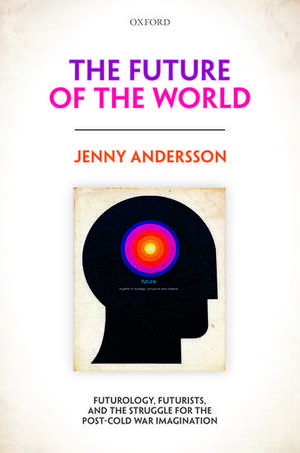The Future of the World: Futurology, Futurists, and the Struggle for the Post Cold War Imagination
Autor Jenny Anderssonen Limba Engleză Hardback – 16 aug 2018
Preț: 582.05 lei
Preț vechi: 706.66 lei
-18% Nou
Puncte Express: 873
Preț estimativ în valută:
111.39€ • 115.86$ • 91.96£
111.39€ • 115.86$ • 91.96£
Carte tipărită la comandă
Livrare economică 04-10 aprilie
Preluare comenzi: 021 569.72.76
Specificații
ISBN-13: 9780198814337
ISBN-10: 019881433X
Pagini: 284
Ilustrații: 9 black and white figures/illustrations
Dimensiuni: 163 x 240 x 23 mm
Greutate: 0.59 kg
Editura: OUP OXFORD
Colecția OUP Oxford
Locul publicării:Oxford, United Kingdom
ISBN-10: 019881433X
Pagini: 284
Ilustrații: 9 black and white figures/illustrations
Dimensiuni: 163 x 240 x 23 mm
Greutate: 0.59 kg
Editura: OUP OXFORD
Colecția OUP Oxford
Locul publicării:Oxford, United Kingdom
Recenzii
The Future of the World is an important book that properly situates the history of future research during the Cold War within its international contextand brings our attention to the methods that futurists used to justify the future worlds theyimagined. Andersson's book also highlights the need for historians to look at the broader institutional landscape of Cold War research firms, of which RAND was just one of many such examples. Such work will not only help us better understand RAND's historical significance, but also the ways in which professional expertise, consultancy, and method all intersected to shape the Cold War world and the one that came out of it.
Notă biografică
Jenny Andersson holds a PhD in economic history from Uppsala University in Sweden. She is currently a scholar with the Centre National de la Recherche Scientifique and based at Sciences Po in Paris, where she also co directs the Max Planck Sciences Po Center. She has worked on the intellectual history of contemporary social democracy, and more recently, on the history of future research and concepts of the future in the post war era.
